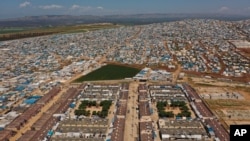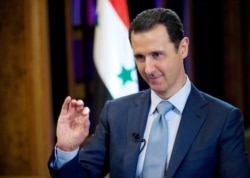Secretary of State Mike Pompeo announced Wednesday the latest round of U.S. sanctions against Syria, tightening pressure on President Bashar al-Assad and his government, amid concerns the war-torn country’s population will suffer.
The sanctions target Assad’s family, Syrian government officials and third-party entities aiding the Assad government.
Under the Caesar Syria Civilian Protection Act that Congress passed in December, President Donald Trump has the power to sanction anyone in the world who conducts business with the official Syrian government.
A White House statement about the Treasury and State departments' sanctions says, “Since the 2011 start to the Syrian conflict, the Assad regime has committed innumerable atrocities against Syrians, including arbitrary detention, torture, sexual violence and murder. These despicable acts have devastated the country’s people, infrastructure and economy, displacing more than half of Syria’s population.
“Today’s designations send a clear message that no individual or business should enter into business with or otherwise enrich such a vile regime.”
Iran, Russia
While the U.S. and European Union have already enacted several rounds of sanctions against Syria, the Caesar Act focuses on those providing financial, material and other aid to the Syrian government, including allies such as Iran and Russia. Foreign companies also may be targeted if they are found to be supporting repression.
Additionally, Assad’s wife, Asma al-Assad, also can be sanctioned for the first time.
The legislation is named for an individual known as “Caesar,” a member of the Syrian military who defected in 2014 and provided 53,275 photos alleged to show evidence of crimes against humanity inside Syria. The 10-year civil war began with street protests against Assad’s government, which launched a brutal crackdown that has killed more than 370,000 people and displaced millions.
Pompeo said sanctions were a “sustained campaign of economic and political pressure” against Assad and not intended to harm the Syrian public, but rather compel the government to halt its military activities on a ravaged public.
“It is time for Assad’s needless, brutal war to end. Today, the Assad regime and those who support it have a simple choice: take irreversible steps toward a lasting political solution to the Syrian conflict in line with [U.N. resolution] UNSCR 2254 or face ever new tranches of crippling sanctions,” Pompeo wrote.
Saying it was committed to a lasting political solution, the White House said that ”the Assad regime and its patrons must recognize that a political resolution is the only viable mechanism to bring a peaceful end to the Syrian conflict.”
Effect on civilians
Criticism has sprung up in recent weeks, raising concerns the sanctions will hurt Syria's civilian population. U.N. statistics estimate that more than 80% of Syrians live below the poverty line, and half the country’s prewar population has fled. Many Syrians have been demonstrating recently, demanding the country’s collapsed economy be fixed.
At a U.N. Security Council session Tuesday, China’s ambassador, Zhang Jun, said issuing sanctions during a global pandemic was “simply inhumane.” Syrian government officials have called the Caesar Act “economic terrorism.”
Safwan Qurabi, a member of Syria’s parliament, said the sanctions were aimed at stirring internal unrest. “The [Caesar] Act aims at pitting the Syrian citizen against the government. The law is an invitation to inner discord and chaos,” he said.
The Foreign Ministry said Syria had vowed to confront the limits, and it urged the international community to work on removing all “illegitimate unilateral sanctions.”
Pompeo rejected the notion of unilateral action, writing in his press release the U.S. “will undertake our campaign of economic and political pressure in full cooperation with other like-minded nations.”







